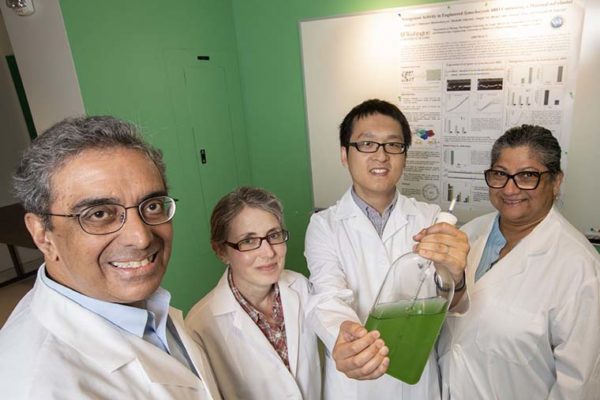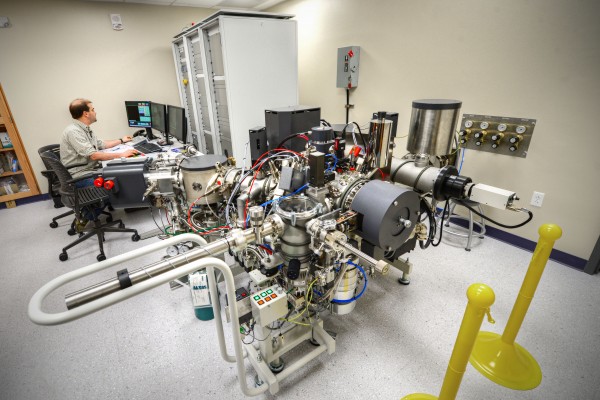Researchers engineer bacteria that create fertilizer out of thin air
A team at Washington University in St. Louis has created a bacteria that uses photosynthesis to create oxygen during the day, and at night, uses nitrogen to create chlorophyll for photosynthesis. This development could lead to plants that do the same, eliminating the use of some — or possibly all — man-made fertilizer, which has a high environmental cost.
$2.4 million instrument upgrade will let scientists see what is happening inside microbes
The U.S. Department of Energy has awarded David Fike, PhD, associate professor of earth and planetary sciences, $2.4 million to adapt a powerful chemical microscope called the 7F-GEO SIMS for biological samples. The updated instrument’s ability to map the chemistry inside cells will boost research on microbes that are promising candidates for biofuel or bioenergy production.
Cyanobacterium found in algae collection holds promise for biotech applications
Cyanobacteria are attractive organisms for the bio-production of fuels, chemicals and drugs but have the drawback that most strains in common use grow slowly. This week scientists at Washington University reported that they have recovered a fast-growing strain of cyanobacteria from a stored culture of a cyanobacterium originally discovered in a creek on the campus of the University of Texas at Austin in 1955. The new strain grows by 50 percent per hour, the fastest growth rate ever reported for this type of bacteria.
Pakrasi receives grant for U.S.-India synthetic biology workshop
Himadri B. Pakrasi, PhD, received a $49,448 grant from the National Science Foundation to support the “Indo-U.S. Workshop on Synthetic and Systems Biology” being held this November in New Delhi. Pakrasi is the Myron and Sonya Glassberg/Albert and Blanche Greensfelder Distinguished University Professor and director of the International Center for Advanced Renewable Energy and Sustainability (I-CARES).
Climate Change Initiative: A conversation
Himadri Pakrasi, PhD, director of the International Center for Advanced Renewable Energy and Sustainability, sat down recently with Peter Raven, PhD, the George Engelmann Professor of Botany Emeritus in Arts & Sciences and
president emeritus of the Missouri Botanical Garden, for a conversation about the Washington University Climate Change Initiative.
I-CARES Day Oct. 19 to feature talks by Raven, Kidder
The International Center for Advanced Renewable Energy and Sustainability (I-CARES) will celebrate its inaugural I-CARES day Friday, Oct. 19. The celebration will feature a talk by Peter H. Raven, former president of the Missouri Botanical Garden, on climate change and its impact on biodiversity, and a presentation by T.R. Kidder, professor and chair of
anthropology, on the idea that we may be entering a new geological era, called the Anthropocene, in which humans are the primary geological change agents. There also will be activities for students, including a
QR-code scavenger hunt.
Glassberg family gift establishes an endowed professorship for I-CARES directorship
Himadri Pakrasi, PhD, director of WUSTL’s International Center for Advanced Renewable Energy and Sustainability (I-CARES), has become the inaugural holder of the Myron and Sonya Glassberg/Albert and Blanche Greensfelder Distinguished University Professor.
Global climate change: Ralph Cicerone joins WUSTL conversation
Ralph J. Cicerone, PhD, president of the National Academy of Sciences and chair of the National Research Council, will present a seminar on climate change at Washington University in St. Louis at 4 p.m. Monday, Jan. 23, in Room 300, Laboratory Sciences Building on the Danforth Campus.
$ 2.2 million Department of Energy grant to build a fuel-producing bacterium
The Department of Energy has funded a three-university collaboration led by Washington University in St. Louis to approach the problem of algal fuels systematically.In a two-step project, the team will first attempt a comprehensive understanding of the metabolic machinery of selected cyanobacterial strains and then implement that understanding by assembling a novel bacterium with the machinery needed to produce fuel molecules. They will be bringing to bear on the problem of algal fuels the most sophisticated approaches contemporary biology now has to offer: systems biology and synthetic biology.
Champion hydrogen-producing microbe
The cyanobacteria are famous for releasing the oxygen that made the Earth a hospitable planet, but some strains also have a hidden talent for producing hydrogen gas, a potential biofuel. With the help of a few metabolic tricks, a lab at Washington University has coaxed one such strain to produce champion levels of the gas.
View More Stories


